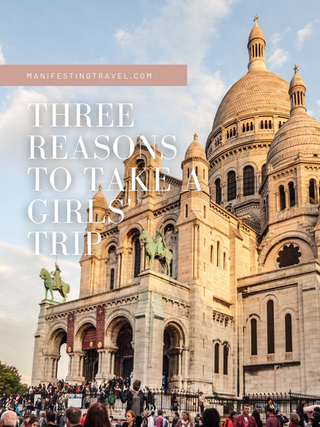
Let's face it, the world has changed. But with the United States and much of Europe slotted to open in July 2021, there's a gleam of hope for travelers who want to feel the wind in their sails again. While it has been hard to speculate the travel trends for 2021, especially since we’ve been through more than a year of lockdowns, let downs and constant despair, telltale patterns have still emerged. And they're centered around human contact and our connection to the planet.
So, what’s on the horizon for post-pandemic travel trends? You might be surprised to hear that many people will still be staying closer to home. With so many waves of resurgences and community healthcare systems still on the verge of collapse, world travel continues to feel a bit like a house of cards. That doesn't mean people won't get up and go, but a two or three-hour flight or car ride is a little bit easier to digest. And that means, we’re about to see spikes in small group travel, glamping, and road trips followed by conservation and sustainable tourism later in the year.

Small Group Travel
If we learned one lesson from isolation, it’s that most of us took human contact and connection for granted. The simplicity of a hug or sharing a great meal with friends has never been missed more than it is now. So the first thing you’re going to want to do when you haven’t been able to see your nearest and dearest for more than a year, is to knock out two birds with one stone: get out of your homes and spend some time together.
The rise in small group travel will be a big boost for boutique hotels and vacation rental markets who can accommodate groups of 10 or more. Especially if they’re a little off the beaten path as some people will still be a little unsure about choosing rentals in crowded places. Lake houses or renting a beach house on places like Whidbey Island or Lummi Island off the coast of Washington are going to see huge spikes. Imagine combing the shoreline for shells, paddle boarding and riding bicycles in the lazy afternoon sun with your favorite people. There’s plenty of space to spread out so nobody feels under each other, but plenty of opportunities to spend time laughing and making new memories over a beach bonfire.
Read more from Lummi Island

Glamping
Oh the wonders of glamping. It gives us the chance to fan our renewed flame for Mother Nature without skimping on comfort and convenience. Let’s be honest, most people love the idea of camping under the stars, falling asleep to the sweet serenades of crickets and frogs, the renewed sense of alignment that comes from nature. But once they get a taste of the nagging side of buzzing and biting bugs, sleeping on a hard ground and no plumbing, the sparkle wears off a little.
Glamping sites span the spectrum of luxury, and can be found all over the world. They range from sweeping safari tents adorned with chandeliers, private plunge pools and butler services on the plains of Botswana, to premium linens, USB plug-ins, heated flooring and marble vanities in the bath house at glamp sites like Ventana’s Redwood Canyon in Big Sur, California. There’s even beach glamping in the UK on a secluded shoreline in Cornwall that was once owned by the Royal Family called Lusty Glaze. With so many different types of glamping to choose from, this trend will only rise in popularity.

Road Trips
Thanks to physical distancing requirements, hitting the open road started to grow during the pandemic and will continue to be a popular method of vacationing. When we didn’t have the option to jet off to far-flung places, we were really forced to look for the beauty at our own doorsteps; the places we’d often taken for granted like state and national parks. It’s a lot less work to play tourist closer to home or plan a visit to a national park. Weekend road trips don’t need much planning, they’re quick and cater to folks who still need time to get comfortable with the idea of travel as it once was. They’re also spontaneous and allow you the freedom and flexibility to follow the wind wherever it may blow you.

Conservation Travel
By the end of 2021, people will start easing back into long-haul travel, but they're going to be more mindful when they do. You no longer have to sign up for a missionary trip to make a difference. With conservation vacations and ecotourism, you’re getting the best of both worlds by choosing your destination and how you want to give back. A super cool company called Discover Corps was founded by a Peace Corps volunteer to show his kids how incredible the planet is while providing meaningful ways for them to contribute. And there are tons of ways you can help.
You can help measure sea-turtles with conservationists in Costa Rica, learn about polar bears with a World Wildlife Foundation partner in Norway, help a veterinarian on a mountain gorilla excursion in Uganda, or even improve infrastructure by helping build bridges in Cuba. And here’s the thing, even if you don’t want to get your hands dirty on vacation, you can choose who you spend your money with and make a difference indirectly. Many tour providers are working with major environmental foundations and donate a portion of the dollars you spend with them to various initiatives. We are finally seeing that the world belongs to all of us, and we’re the only ones who are going to save it.

More Sustainable Travel
In the last year, we saw how the planet started to repair itself when humans were stuck inside. Wildlife reemerged in places it hadn’t been seen in years, emission levels were down, over tourism came to a screeching halt. It’s as if the planet let out a giant sigh of relief.
When we think about the destruction travel can bring, for instance what the cruise ships are doing to Venice or the crush of people who are trampling the ruins at Machu Picchu, we realize we can and must do better. And frankly, there’s nothing worse than waiting your whole life to visit a place and being completely turned off by the reality of hordes of tourists and over commercialization.
Take Greece for example. While Santorini is stunning, there are so many beautiful islands that are far less crowded; and people will be looking for them. The lull in tourism gave governments room to breathe so they could tackle these issues. They now have the chance to promote other regions and culturally-immersive experiences like those found in Paxos, Corfu, Zakynthos or Crete.
Sustainable tourism trends will grow because we are becoming aware of the role we play in the degradation of the places we've grown to love so much. We now see firsthand that preservation is critical for future generations.
Want more Travel Talk?

Ashley Oñoz-Wright has been a travel writer and editor based in Las Vegas, NV for the last eight years and is a regular contributor for Manifesting Travel, Modern Luxury, Sophisticated Living, Greenspun Media Group, Vegas.com and LasVegas.com. She holds a degree in Sociology & Anthropology from DePauw University.












